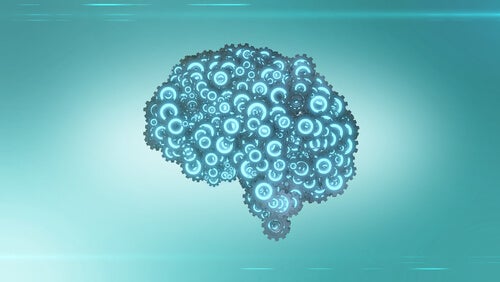Can You Reverse Memory Loss?

A well-known fact of human life is that memory tends to deteriorate with age. However, recent studies show that there might be a way to reverse memory loss.
New techniques such as transcranial magnetic stimulation may be able to reverse the effects of memory loss caused by aging. A study by Robert MG Reinhart and John A. Nguyen shows that this technique could restore older adults’ memories to work like that of a much younger person. Let’s take a closer look!
“That memory, the warder of the brain.”
-William Shakespeare-

Memory loss with aging
When people reach a certain age, they often complain of having trouble remembering people’s names, dates, or simple, day-to-day information.
One of the most common symptoms is the loss of working memory (also called operative memory). This is the type of memory that helps you with everyday tasks such as remembering phone numbers, doing calculations, making decisions, and dealing with day-to-day situations. Working memory allows you to temporarily store and manipulate information.
Over the years, working memory deteriorates, which can make it difficult to get through your day.
Neurons lose touch with each other
Why does working memory deteriorate in the absence of a neurodegenerative disease? Scientists still don’t know the answer to this question.
One recently published study found that synchronicity between neurons when they’re stimulated is important for a well-functioning memory.
Neurons are cells that respond to stimuli and then transmit the information to other neurons. However, if they’re out of synch, it would be similar to listening to an orchestra where individual musicians are all playing to their own rhythm. The result would be chaos. Something similar happens with neurons. When they get out of synch, memory starts to fail.
Reverse memory loss in just 25 minutes
In a study published in Nature magazine, researchers used transcranial magnetic stimulation to stimulate neurons and try to reverse memory loss. There were two groups of study participants: the first group was between the ages of sixty and seventy years old and the second was about 30 years younger.
Researchers stimulated different parts of the participants’ brains related to memory for 25 minutes. While they were stimulating the brain, they noticed that the neurons regained their synchronicity in those areas.
Surprisingly, after the stimulation, the sixty to seventy-year-old participants recovered mental agility at a level comparable to much younger volunteers. Unfortunately, this incredible memory loss reversal only lasted for about 50 minutes after the stimulation. After that, their memories returned to normal.
A hopeful therapy
Although the effects were only temporary, scientists believe that this experiment shows that memory loss isn’t irreversible.
Transcranial magnetic stimulation could also be a promising alternative therapy for people suffering from cognitive deterioration caused by Alzheimer’s.

Beyond memory
In addition to stimulating neurons to improve memory, this therapy can be applied to other health problems as well.
For example, some doctors are using it to correct post-injury dysphagia (difficulty swallowing). They stimulate the area of the brain that stimulates the musculature of the esophagus to improve swallowing ability.
Lastly, as scientists work on perfecting transcranial magnetic stimulation, they’ll undoubtedly discover new applications for this innovative technology. Perhaps in the not-too-distant future, they’ll invent “portable” devices that people can use at home to treat all kinds of health problems.
A well-known fact of human life is that memory tends to deteriorate with age. However, recent studies show that there might be a way to reverse memory loss.
New techniques such as transcranial magnetic stimulation may be able to reverse the effects of memory loss caused by aging. A study by Robert MG Reinhart and John A. Nguyen shows that this technique could restore older adults’ memories to work like that of a much younger person. Let’s take a closer look!
“That memory, the warder of the brain.”
-William Shakespeare-

Memory loss with aging
When people reach a certain age, they often complain of having trouble remembering people’s names, dates, or simple, day-to-day information.
One of the most common symptoms is the loss of working memory (also called operative memory). This is the type of memory that helps you with everyday tasks such as remembering phone numbers, doing calculations, making decisions, and dealing with day-to-day situations. Working memory allows you to temporarily store and manipulate information.
Over the years, working memory deteriorates, which can make it difficult to get through your day.
Neurons lose touch with each other
Why does working memory deteriorate in the absence of a neurodegenerative disease? Scientists still don’t know the answer to this question.
One recently published study found that synchronicity between neurons when they’re stimulated is important for a well-functioning memory.
Neurons are cells that respond to stimuli and then transmit the information to other neurons. However, if they’re out of synch, it would be similar to listening to an orchestra where individual musicians are all playing to their own rhythm. The result would be chaos. Something similar happens with neurons. When they get out of synch, memory starts to fail.
Reverse memory loss in just 25 minutes
In a study published in Nature magazine, researchers used transcranial magnetic stimulation to stimulate neurons and try to reverse memory loss. There were two groups of study participants: the first group was between the ages of sixty and seventy years old and the second was about 30 years younger.
Researchers stimulated different parts of the participants’ brains related to memory for 25 minutes. While they were stimulating the brain, they noticed that the neurons regained their synchronicity in those areas.
Surprisingly, after the stimulation, the sixty to seventy-year-old participants recovered mental agility at a level comparable to much younger volunteers. Unfortunately, this incredible memory loss reversal only lasted for about 50 minutes after the stimulation. After that, their memories returned to normal.
A hopeful therapy
Although the effects were only temporary, scientists believe that this experiment shows that memory loss isn’t irreversible.
Transcranial magnetic stimulation could also be a promising alternative therapy for people suffering from cognitive deterioration caused by Alzheimer’s.

Beyond memory
In addition to stimulating neurons to improve memory, this therapy can be applied to other health problems as well.
For example, some doctors are using it to correct post-injury dysphagia (difficulty swallowing). They stimulate the area of the brain that stimulates the musculature of the esophagus to improve swallowing ability.
Lastly, as scientists work on perfecting transcranial magnetic stimulation, they’ll undoubtedly discover new applications for this innovative technology. Perhaps in the not-too-distant future, they’ll invent “portable” devices that people can use at home to treat all kinds of health problems.
This text is provided for informational purposes only and does not replace consultation with a professional. If in doubt, consult your specialist.







